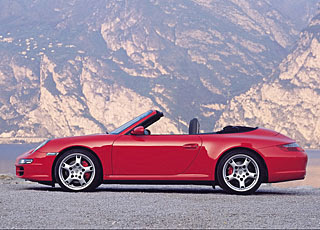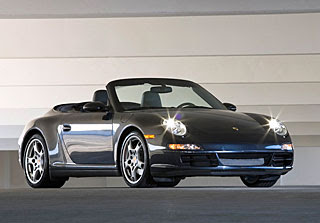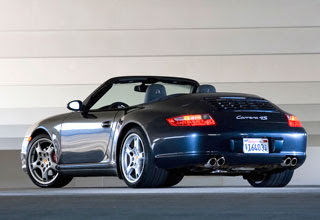2007 Porsche 911 Carrera 4S
(from Porsche Press Release) The wide-body Porsche 911 returned to the lineup for the 2006 model year in the form of the 911 Carrera 4 and the even more powerful 911 Carrera 4S. Both feature flared wheel arches to accommodate a widened track, larger wheels and tires and all-wheel-drive powertrains that give the venerable Porsche 911 additional dimensions of dynamic stability, especially in inclement weather conditions.





 With its even more powerful 355-horsepower, 3.8-liter “boxer” six, the 2007 Porsche 911 Carrera 4S sprints to 60 mph (96 km/h) in a mere 4.6 seconds and closes in on 99 mph in just 10.8 seconds. Top speed on the test track is 179 mph (288 km/h). The Tiptronic ® S version accelerates to 60 mph (96 km/h) in 5.0 seconds and reaches 99 mph (160 km/h) in 11.7 seconds. Top track speed is 174 mph (280 km/h).
With its even more powerful 355-horsepower, 3.8-liter “boxer” six, the 2007 Porsche 911 Carrera 4S sprints to 60 mph (96 km/h) in a mere 4.6 seconds and closes in on 99 mph in just 10.8 seconds. Top speed on the test track is 179 mph (288 km/h). The Tiptronic ® S version accelerates to 60 mph (96 km/h) in 5.0 seconds and reaches 99 mph (160 km/h) in 11.7 seconds. Top track speed is 174 mph (280 km/h).To create the more powerful 3.8-liter engine that provides 355 horsepower for the 2007 Porsche 911 Carrera 4S, engineers did more than simply increase the bore diameter by 0.12 inches (3 mm). They changed the intake manifold and modified the intake camshaft lift pattern. Injector angles were changed to enhance fuel flow to the center of the combustion chamber.
This enhanced fuel/air mixture also reduces exhaust emissions, even after a cold start, and increases torque throughout the power curve. A short-pipe exhaust manifold for the 911 Carrera 4S engine further reduces emissions.
The intake system was further designed to provide less resistance. A Helmholtz resonator is used to enhance acoustics. This provides more than 18 cubic inches (0.3 liters) of additional resonance volume between the hot-film air mass meter and the throttle butterfly and is activated between 5,000 and 6,000rpm to reduce oscillations in intake sounds. Porsche has applied for a patent for this technology that provides a deep, throaty sound without aggressive peaks.
Higher combustion forces produce more power but also more torsional crankshaft vibration, so Porsche engineers integrated a vibration damper in the pulley at the end of the crankshaft. While conventional vibration dampers are made of cast iron, Porsche engineers devised an aluminum damper that reduces weight by some 3.3 lbs (1.5 kg) while controlling vibrations to a level even lower than the 3.6-liter engine. Amazingly, the 3.8-liter engine weighs no more than the 3.6-liter unit, thanks to its lighter intake manifold.
While the 3.8-liter engine uses twin radiators like the 3.6-liter powerplant, it has a higher performance cooling pump and an oil/water heat exchanger with two additional cooling layers.
Labels: 2007 Porsche 911 Carrera 4S, Porsche





0 Comments:
Post a Comment
<< Home